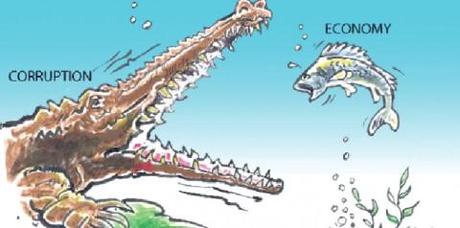 For the past five years of civil rule, common man has fought tooth and nail to gain better living but every demand of common man in this regard is met with stiff opposition from the capitalist ruling class at all levels. The economy is stagnant, with unemployment at record levels. Pakistan today even lags behind Bangladesh, Sri Lanka, and Nepal. In every corner of the country, a portrait of hunger has now emerged. Food prices all over the country are skyrocketing and many people are going hungry. Agriculture, the most important sector of the economy, has been severely affected by abnormal price hike of energy, fuel, fertilizer, seeds and machinery. Across the country, the number of hungry and homeless people is rapidly growing. The unprecedented recession has pushed millions of more children into poverty. Tens of million children are “food insecure,” and their parents often don’t know where the next meal will come from. People who have been middle class who are now struggling to put food on the table are feeling an enormous amount of stress. Things are going to get tough. The people don’t know what they are going to do. The poor households are selling everything they possibly can – their clothes, pots, and even their houses. Their domestic relationship is becoming extremely strained.
For the past five years of civil rule, common man has fought tooth and nail to gain better living but every demand of common man in this regard is met with stiff opposition from the capitalist ruling class at all levels. The economy is stagnant, with unemployment at record levels. Pakistan today even lags behind Bangladesh, Sri Lanka, and Nepal. In every corner of the country, a portrait of hunger has now emerged. Food prices all over the country are skyrocketing and many people are going hungry. Agriculture, the most important sector of the economy, has been severely affected by abnormal price hike of energy, fuel, fertilizer, seeds and machinery. Across the country, the number of hungry and homeless people is rapidly growing. The unprecedented recession has pushed millions of more children into poverty. Tens of million children are “food insecure,” and their parents often don’t know where the next meal will come from. People who have been middle class who are now struggling to put food on the table are feeling an enormous amount of stress. Things are going to get tough. The people don’t know what they are going to do. The poor households are selling everything they possibly can – their clothes, pots, and even their houses. Their domestic relationship is becoming extremely strained.
In fact, Pakistan is composed of two distinct groups: the rich and the rest. And for the purposes of investment decisions, the second group doesn’t matter; tracking its spending habits or worrying over its savings rate is simply a waste of time. All the action in the economy is at the top: the richest 10 percent of households earn as much as the bottom 80 percent put together; they possess as much wealth as the bottom 90 percent; and with each passing year, a greater share of the nation’s wealth is flowing through their hands and into their pockets. It is this segment of the population, almost exclusively, that holds the key to future growth and future returns. Rest of the population is merely consumers of their products. The capitalist political class has severally and collectively plundered the huge resources of the nation, while the poor masses go hungry, is no more news.
Rulers of Pakistan are responsible for all this. PPP has given nothing to people except for price hike, unemployment, loss of institutions, lawlessness, ethnic and regional conflicts, drone attacks and dead bodies during their five year rule. Pakistan’s economy is severely disrupted by these devastating five years of so called democracy. With the collapse of a central authority and mounting regional and ethnic conflicts created by the PPP, the delivery of services collapsed, and the population was pushed to hunger and poverty. The richest people are going home with a bigger share of national wealth than ever before, while the poor end up with even less; the taxation system is such that the poor — through indirect taxes — are subsidizing the lifestyle of the rich, who do not pay direct taxes on their assets. Any efforts to restructure the tax system fail because of political expediency in a fragmented parliament. The common man can not arrange two square meals for his family whereas the properties of politicians and their foreign bank accounts are increasing with each passing day.
Pakistan poverty is unnecessary. It is mainly the result of bad policy. Our leaders think of nothing but making money, from whatever source. Their recklessness played a role in the current financial crisis in the country; rather this crisis is a consequence of Capitalism and globalization. Neoliberal advisors had promised that Pakistan would become more efficient and affluent by following their policies, polarization between rich and poor over the past five years has seen falling living standards and a dismantling of manufacturing, education and public infrastructure go hand in hand with creation of a new class of instant billionaires at the top of a steeper economic pyramid than exists in Western industrial powers.
The government is not improving public-sector efficiency and transparency and not at all ready to implementing a public financial-management-reform strategy and installing information-management systems, and developing and sustaining human and institutional capacity remains a challenge. It is depending merely on more and more debts from internal and external sources instead of some permanent policy formulation. In view of this dismal economic picture if this situation continues to persist then the day is not far when the country’s economy will go bankrupt making it impossible for the people to survive?
For a country like Pakistan, seeking funding is not the solution; dealing with issues, such as tax evasion, corruption and money laundering can help deal with poverty. It is fundamental to eliminating poverty, promoting development and achieving political and economic freedom. Aid turns people into slaves, while trade turns people to equals and ensures progress and growth. Trade is the only thing that will make us powerful, while aid will make us beggars. In any case, foreign aid makes up for a very small part of the national budget and generally benefits those who are associated with the programs; maybe it is time to lose the support wheels and try riding the bicycle without them. People should vote for honest and patriotic leaders in the forthcoming general elections. It is necessary for the prosperity of Pakistan to elect patriotic leadership and to get rid of the corrupt leaders. The country could be saved by getting rid of artificial and corrupt leadership.This country desperately requires excellent, positive and valuable leadership. The day it does; this country will improve within very short time. Let’s pledge that we shall make efforts to perform our duties honestly and faithfully.

